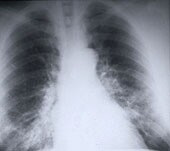
TUESDAY, July 5 (HealthDay News) — A drug designed to treat certain patients with non-small cell lung cancer boosts survival time without progression of cancer by several months, according to a new study.
The findings reveal that the drug, known as erlotinib (brand name Tarceva), doesn’t just boost lifespan, said Dr. Neal E. Ready, associate professor of medical oncology at Duke Cancer Institute, who was not involved with the study. “What you really get is a prolonged period of time when the cancer is under control and someone has a really good quality of life.”
This study is the first of its kind to look at Western patients. “Although a growing body of evidence has been emerging about this type of lung cancer, almost all of the studies have been conducted in Asian patients, a group that historically has had significantly different results to [non-small cell lung cancer] therapy compared to Western populations,” said principal investigator Dr. Radj Gervais, of the Centre Francois Baclesse in Caen, France, in a news release from the International Association for the Study of Lung Cancer. The association is hosting the World Conference on Lung Cancer in Amsterdam, where the study results were scheduled for presentation Tuesday.
The study of the drug is a phase 3 study. That means it’s in the final of three stages of testing that drugs undergo before they can be approved for treatment of a specific disease.
The researchers randomly assigned 174 patients to either erlotinib or platinum-based chemotherapy. Preliminary results showed that about 55 percent of patients responded to the drug, compared to nearly 11 percent to chemotherapy. Patients lived without progression of cancer for 9.4 months with the drug compared to 5.2 months for those who received chemotherapy.
And the median survival was 22.9 months for those who took the drug compared to 18.8 months for those on chemotherapy, the investigators found.
“Our results showed that first-line erlotinib nearly doubled progression-free survival; that’s a significant improvement over chemotherapy, with a better tolerability profile,” Gervais said in the news release.
Commenting on the findings, Ready pointed out that the research is important because it shows the value of targeting treatment towards patients with specific types of non-small cell cancer. “In oncology as a field, we’re trying to move to identify the right treatment for the right patient,” he said.
Erlotinib’s side effects — including an acne-type rash and diarrhea — are easier to control than those of chemotherapy, he added. As for expense, Ready noted, oral therapies, like this one, tend to be as costly or less expensive than chemotherapy, considering that they cause fewer side effects that need to be managed.
Because this study was presented at a medical meeting, the data and conclusions should be viewed as preliminary until published in a peer-reviewed journal.
More information
For more about lung cancer, visit the U.S. National Library of Medicine.

